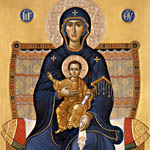This is a page on my Hagia Sophia website where you can find links to more pages in the site with great Byzantine stuff

Chapter XXXIII
Minor Ordeals
One day quite early in September, my young daughter sent me a heart-breaking note from Tsarskoe, the tidings contained in ,vhich were con-firmed by the man-servant who brought it to me. Towards three o'clock in the morning, while they were sleeping peacefully, the familiar noise of nocturnal visitors awoke them. Alone in the house with Miss White, Jacqueline, and that faithful couple, the man-servant and his wife, and the lauudress, they jumped out of bed and demanded of the intruders the reason of their visit. Among them, they recognised to their alarm our former chauffeur Zvereff, who was drunk and who had brought the band there, and also Ie Barbu, the footman, who had left us some time before. The leader of the baud replied that, on information given by the chauffeur and by the footman, whose name was Savinkoff (what a name of ill omen!), they were going to ransack everywhere and take all the silver. "For," he said, "your mother sells it in order to send money to Siberia to help on a counter-revolution." (My poor son had been assassinated bvo months before but we did not know it at the time.)
Fortunately for my girls, while the search was in progress, B--, the Commandant of Tsarskoe, and his aide-de-camp, Gavriloff, arrived. Not daring to interrupt their comrades in their task, they advised them, owing to the lateness of the hour, to lock up all their booty in one room, that is to say the silver dishes and covers, and the Grand Duke's toilet requisites, things of mine, the girls' dresses - even some new pairs of shoes! Then B-- locked the door and put the key in his pocket. Next day, as I was going to Tsarskoe to console my poor children, he came to see me, gave me back the key, and explained that the nocturnal expedition was to be ascribed to revengeful feelings on the part of the two servants. After that we never had a moment's peace. We were at the mercy of these peasants who were able to decide our lot as best pleased them. We now merely lived from day to day. The hope, however, that such a nightmare state of things could not last - that something, some miracle, would come to save us - gave us the courage to live.
One morning, on opening the abominable Bolshevist newspaper, so difficult to read on account of the new orthography made by illiterates, I saw with a feeling of stupor a decree, signed Zinovieff (really the Jew, Radomisky), anuouncing that: "The house of the Citizeness Paley, situated at Detskoe-Selo*, is nationalised with all it contains, and the competent authorities are to take the measures involved in the nationalisation." I immediately took the train to Tsarskoe and after a visit to Irene and Nathalie at the cottage, I hastened to the palace. Comrade Telepneff, who was very ill at ease, received me there and said to me:
Yes, it is so, I have received this order and I have been appointed controller of the museum in your place. I am going to install myself with my wife and children in the left wing of the palace in Colonel Petrokow's suite of rooms. As to the kitchens, with all they contain, as well as the table-linen and bed-linen, ali that will be at the disposal of the Communist schools. Your dynamos will become the property of the town. You are authorised to take your ikons, your photographs, some dresses and your under-linen. I myself," he added, " am leaving in a few days on a mission to Penza, to bring back some corn to the north. Comrade Boris Moiseevitch Snessarenko will take my place."
At any other time such a piece of news would have shattered me; now, with the Grand Duke in prison, Vladimir far away, myself already gravely ill, I accepted the blow with resignation. I went sadly through the beautiful house, my own creation, and in which there had been so little happiness for us. I reviewed in my mind the four years that had passed-the war, my husband's grave illness and the Revolution-and now this new piece of Bolshevist brigandage. However, just to satisfy my conscience and so as not to have to reproach myself later with having done nothing to save the house, I asked for an interview with :Mme. Lounatcharsky, the wife of the Commissary of Fine Arts. It was Boris Moisseievitch Snessarenko, Telepneff's temporary substitute, who undertook to give this message for me.
The Lounatcharsky couple had installed themselves in the Alexander Palace, in the right wing, above the rooms which the Empress Marie Fedorovna occupied when she came to Tsarskoe. On being shown in to the new mistress of the establishment, I saw a little woman, somewhat faded already, with a rounded face, inexpressive, but with pretty blue eyes. I expressed to her my astonishment over the nationalisation of my home. Why this measure, as the public were already able to visit it twice a week? She replied that all the beautiful houses would experience the same fate, but that there would be a way of arranging things if I would enter the service of the Soviet.
"In what capacity? " I asked.
"Oh, as a member of the Fine Arts Committee, of a course."
I said I would like to reflect over the matter and taIk with my husband about it, and I entreated her with all the strength which one woman can entreat another to help me to get my husband out of prison. She promised (all the Bolshevists promise and never keep their word) and began to try to convert me to the beauty of the Bolshevist doctrine. Finally she said to me:
"Bolshevism will rule everywhere." Then, after a moment of reflection: "Perhaps not in America. Thus you must either submit or die."
I left her, feeling that I had wasted au hour of mv time, that her words were sterile, and that . she \vould do nothing either for my husband or for the de-nationalisation of the palace.
At my next meeting in the prison with the Grand Duke I spoke to him of Mme. Lounatcharsky's proposal as to my entering the Bolshevist's service. "God preserve you from it!" my husband exclaimed. "I'd rather die a hundred times than know my wife was in the service of these bandits."
Some days later I was informed that the store of wood which we had in the Grand Duke Boris's small house was going to be confiscated. What was to be done? Despite all my courage, I was beginning to lose my head. They were taking everything, everything was going at once. I learnt that this order emanated from Lounatcharsky's assistant, a man named Kimmel. I went, therefore, to see him at the \Vinter Palace, in the part which has its back to the Hermitage and the windows of which look out on the Neva.
This Kimmel was a Lett. His appearance was not unpleasant: dark eyes, inteIligent and piercing, regular features, a small pointed beard. The effort to give himself the airs of a gentleman was obvious. I learnt later that having as his secretary a Princess Schakovsky, nee Andreew, he had fallen very much in love with her and gave much attention to his dress and language in the hope of winning the good graces of this young lad. I explained to him the position of things, I told him that, with winter coming on, my two young daughters could not live without the few hundreds of logs which remained to us.
"You know very well," he said, "that there is a way of arranging everything."
"What way?"
"By agreeing to come in with us. You would be given the highest post. You would be at the head of the Society for protecting objects of art and antiquities, and you would be Directress of your own museum. Say' yes,' and you shall have no reason to complain of us. I shall await your reply."
"My reply is ready, Monsieur Kimmel, I refuse,"
"Why?"
"Because the wife of a Grand Duke cannot serve the Soviet."
"You forget that ythere are no longer any Grand Dukes."
"There are none any longer for you, but there are for me. We are too far apart, you see."
" n that case, Madame, I can go so far as to give you back your firewood, but no other concession is possible. Have you taken away from your former house your photographs and ikons - they are all the same thing in our eyes,"
"No, :Monsieur, not yet. I propose to do so one of these days. But tell me, as you despise so much our sacred ikons, what do you love upon this earth; to what God do you pray? "
"The Red Flag, Madame! That is our ikon; that is our God! I have one at the head of mv . bed, and I kiss the corner of it every night..."
"Very well! See the difference; for me it is only a villainous rag. . . ."
Some moments later I left him; glad to have secured a signed document, thanks to which our firewood would not be confiscated.
I returned several times to Gorky's, always in the hope of obtaining the liberation of my husband. I knew that Bokiy had given Prince Gabriel back his freedom, and that Gorky had taken in the Prince and Princess to live with him. At two of these interviews, so barren of results, his campagne, MIarie Fedorovna Gorky, was present. Extremely elegant, covered with pearls and sables, still pretty enough, and slender, she made on me the impression of a provincial actress playing the role of a duchess, Lenin and Lounatcharsky had appointed her principal Directress of the Communist theatres, and it was sad and comic at the same time to note the servility of the Imperial actors and actresses before her.* She carried herself easily and gracefully, admired herself much, and left a wake of exquisite perfume behind her when she moved. At the door stood a superb automobile (evidently requisitioned), the electric lights of which blinded the unfortunate people who came to seek a little help and comfort from the wily pair. '"
* Mme. Gorky is no longer at the head of the Communist Theatre. She is Commisary for commerce abroad and occupies herself selling in Berlin and Stockholm the objects of art and the jewellery stolen in Russia. This she finds infinitely more profitable than the management of the theatre. -(Author's Note, 1923.)





